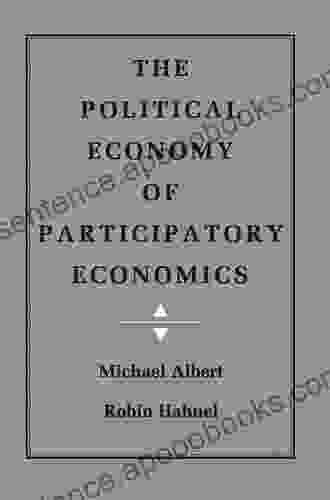Unveiling the Political Economy of Participatory Economics: A Transformative Blueprint for a Humane and Equitable World

Amidst the complexities and inequalities of the modern economic landscape, a transformative vision emerges: Participatory Economics. This innovative approach challenges the conventional wisdom of centralized planning and market fundamentalism, offering a compelling alternative that empowers citizens to shape their economic destiny. In his groundbreaking work, "The Political Economy of Participatory Economics," Dr. Robin Hahnel meticulously unveils the intricate workings of this radical economic model, illuminating its potential to create a more just and sustainable world.
The Essence of Participatory Economics
Participatory Economics is a decentralized economic system that places decision-making power directly in the hands of individuals and communities. It stands in stark contrast to the top-down structures of traditional capitalism and the bureaucratic rigidities of socialism. At its core, Participatory Economics is about self-management, with individuals and local collectives playing a vital role in determining the allocation of resources, the production of goods and services, and the distribution of wealth.
4 out of 5
| Language | : | English |
| File size | : | 16868 KB |
| Screen Reader | : | Supported |
| Print length | : | 144 pages |
Key Principles of Participatory Economics
1. Worker Self-Management: Workers have the autonomy to organize and manage their workplaces, making decisions about production techniques, staffing, and resource allocation.
2. Consumer Self-Management: Consumers directly participate in decision-making regarding the production and distribution of goods and services that meet their needs.
3. Participatory Planning: Individuals and communities engage in collaborative planning to establish broad economic goals and coordinate resource use.
4. Balanced Job Complexes: Work is organized into complexes that ensure that all tasks, both skilled and unskilled, are socially valued and contribute to the overall well-being of society.
5. Compensating Labor Time: Individuals are compensated for the total labor time they contribute, regardless of their occupation or position, fostering equity and encouraging socially beneficial work.
The Benefits of Participatory Economics
The implementation of Participatory Economics holds immense promise for societies worldwide:
1. Economic Democracy: Citizens have a direct say in shaping their economic future, fostering a sense of empowerment and accountability.
2. Reduced Inequality: The balanced job complexes and compensating labor time principles mitigate economic disparities, promoting a more just distribution of wealth.
3. Increased Efficiency: Self-management and consumer participation encourage resource optimization, reducing waste and promoting efficiency.
4. Sustainability: Participatory Economics emphasizes local production and self-reliance, reducing environmental impact and fostering sustainable practices.
5. Enhanced Social Cohesion: The collaborative decision-making processes foster community cohesion and a shared sense of purpose.
Overcoming Challenges and Implementing Participatory Economics
While the benefits of Participatory Economics are undeniable, transitioning to this model presents challenges that must be addressed thoughtfully:
1. Overcoming Capital Resistance: Shifting to a decentralized economic system requires confronting the resistance of those with vested interests in maintaining the status quo.
2. Developing Institutional Structures: Establishing the necessary institutional structures to support participatory planning and decision-making can be a complex process.
3. Cultivating Participatory Culture: Implementing Participatory Economics requires a shift in societal values, fostering a culture of collaboration and community involvement.
4. Addressing External Factors: Participatory Economics must navigate the challenges posed by external economic pressures and international trade.
"The Political Economy of Participatory Economics" by Dr. Robin Hahnel is an indispensable guide to the transformative potential of this radical economic model. Hahnel's rigorous analysis and thought-provoking insights provide a roadmap for transitioning to a more humane, equitable, and sustainable world. By embracing the principles of Participatory Economics, we can unlock the power of individual and community self-determination, creating a future where economic prosperity serves the well-being of all.
4 out of 5
| Language | : | English |
| File size | : | 16868 KB |
| Screen Reader | : | Supported |
| Print length | : | 144 pages |
Do you want to contribute by writing guest posts on this blog?
Please contact us and send us a resume of previous articles that you have written.
 Book
Book Novel
Novel Page
Page Chapter
Chapter Text
Text Story
Story Genre
Genre Reader
Reader Library
Library Paperback
Paperback E-book
E-book Magazine
Magazine Newspaper
Newspaper Paragraph
Paragraph Sentence
Sentence Bookmark
Bookmark Shelf
Shelf Glossary
Glossary Bibliography
Bibliography Foreword
Foreword Preface
Preface Synopsis
Synopsis Annotation
Annotation Footnote
Footnote Manuscript
Manuscript Scroll
Scroll Codex
Codex Tome
Tome Bestseller
Bestseller Classics
Classics Library card
Library card Narrative
Narrative Biography
Biography Autobiography
Autobiography Memoir
Memoir Reference
Reference Encyclopedia
Encyclopedia V R Christensen
V R Christensen Thom Atkins
Thom Atkins Peter Aleshire
Peter Aleshire Debra Griffin
Debra Griffin Ella Carey
Ella Carey Shraddhesh Chaturvedi
Shraddhesh Chaturvedi Diana Drew
Diana Drew Jr Moores
Jr Moores Leslie A Sprout
Leslie A Sprout Waln K Brown
Waln K Brown Karlheinz Zuerl
Karlheinz Zuerl Erica Hogan
Erica Hogan David Aliano
David Aliano William Scanlan
William Scanlan Andrew Emery
Andrew Emery Tomasz Cichawa
Tomasz Cichawa Reem Harb
Reem Harb Claudia Rosett
Claudia Rosett Collins Kids
Collins Kids Kirsty Hartley
Kirsty Hartley
Light bulbAdvertise smarter! Our strategic ad space ensures maximum exposure. Reserve your spot today!

 Liam WardEmbark on an Epic Quest with "Seeker of Time Buckler": A Literary Masterpiece...
Liam WardEmbark on an Epic Quest with "Seeker of Time Buckler": A Literary Masterpiece... Javier BellFollow ·5.4k
Javier BellFollow ·5.4k Dwight BellFollow ·17.7k
Dwight BellFollow ·17.7k Jules VerneFollow ·16.5k
Jules VerneFollow ·16.5k Xavier BellFollow ·8k
Xavier BellFollow ·8k Dylan HayesFollow ·13.7k
Dylan HayesFollow ·13.7k Willie BlairFollow ·7.3k
Willie BlairFollow ·7.3k Austin FordFollow ·8.7k
Austin FordFollow ·8.7k Allen GinsbergFollow ·15.8k
Allen GinsbergFollow ·15.8k

 Julian Powell
Julian PowellShetland Pony: Comprehensive Coverage of All Aspects of...
The Shetland...

 Cason Cox
Cason CoxHow Anaesthetics Changed the World: A Medical Revolution...
Imagine a world where surgery is an...

 Harold Powell
Harold PowellUnleash Your Inner Songwriter: The Ultimate Guide for...
Calling all aspiring songwriters!...

 Nikolai Gogol
Nikolai GogolUnleash Your Artistic Potential: Quick Draw Anatomy for...
In the dynamic and visually...

 Tim Reed
Tim ReedThe Rock 'n' Roll Life of Legendary Sax Man Bobby Keys
The Rock 'n' Roll Life...

 Damon Hayes
Damon HayesMoney Management Activities for Youth: A Guide to...
In an era marked by rapidly...
4 out of 5
| Language | : | English |
| File size | : | 16868 KB |
| Screen Reader | : | Supported |
| Print length | : | 144 pages |










